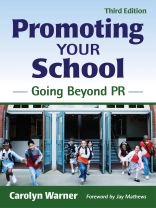’Clearly indicates how to communicate with a variety of groups to obtain public support. This book is very easy to read and understand and has a wealth of examples.’
—Anne Roede Giddings, Assistant Superintendent
Ansona Public Schools, CT
’The examples spur thought on how schools can best communicate with their communities. The book is truly a practitioner′s handbook that any educator can learn from and immediately put into use.’
—Bruce Deterding, Principal
Wichita Heights High School, Wichita, KS
Project a positive school image in your community through effective communication!
Novice and experienced school leaders will find this updated edition of a bestseller packed with techniques for delivering a school′s message effectively to internal and external constituencies and strengthening the partnership between schools, families, the community, and the private sector.
Based on examples from successful schools, this comprehensive guide provides strategies, insights, and practical tools for successfully communicating school goals, successes, challenges, and educational priorities. The third edition offers updated strategies within each chapter and new chapters on using technology and gaining support for public schools. Readers will find:
- Information on media relations, crisis management, team building, and parent involvement
- Coverage of school and community resources to build a support base of human, material, and financial capital
- Forms, sample documents, handouts, and checklists for developing a customized school communications program
Promoting Your School serves as an ideal coach on how to be an articulate advocate for your own school and develop a supportive constituency to help advance school goals.
Innehållsförteckning
List of Resources and Sample Documents
Foreword by Jay Mathews
Preface to the Third Edition
Acknowledgments
About the Author
Part I. Establishing Communication
1. The Foundation of Success
The Communication Process
Dealing With Perceptions
Opinion Leaders
Getting the Word Out
2. Making Your Schools Stand Out
Improving Your Image
Strategic Planning: The Key to Organizational Success
Developing a Marketing Plan
Ideas to Help You Get Started
References and Suggested Readings
3. Internal Communication
Techniques for Improving Staff Communication
Techniques for Improving Student Communication
References and Suggested Readings
4. Publications/Electronic Communications
Newsletters
Technology Tools
Monthly Calendar/Menu
Parent/Student Handbooks
Brochures and Flyers
Language
Suggestions for Better Writing
References and Suggested Readings
5. Media Relations
Building a Working Relationship With Reporters
Getting Your Story to the Media
Writing a News Release
Preparing a Media Tip Sheet
Writing a Public Service Announcement (PSA)
Dealing With Newspapers
Using Television Effectively
Working With Radio
Tips for Talking to the Media
References and Suggested Readings
Part II. Building and Strengthening Partnerships
6. Building Your Team
Who Makes Up the Team
Successful Teams Communicate Well
The Leader as Facilitator
Defining the Task
Getting to Work
References and Suggested Readings
7. Involving Parents in School
Effective Educators Seek Parent Support
Ways to Involve Parents
Changing Demographics of the American Family
Hard-to-Reach Parents
Parents Needed for Political and Economic Support
References and Suggested Readings
8. Community Outreach
Getting the Community Involved
References and Suggested Readings
9. Rallying Support for Public Education
Career and Vocational-Technical Education
How State Coalitions Are Raising Support for Public Education
10. Strengthening and Showcasing Instruction
Cooperative Learning
Authentic Instruction
Problem-Based Learning
Interdisciplinary Units
Incorporating Technology
Multiple Intelligences
Assessment
References and Suggested Readings
Part III. Acknowledging Change
11. Crisis Management
Organizing a Crisis Planning Committee
Developing a Crisis Plan
School Crisis Team
Managing the Crisis
Communicating the Situation
After the Crisis
A Private Crisis
References and Suggested Readings
12. Data Gathering: Road Map for Accomplishments
Types of Data Gathering
Identifying Your Target Audience
Deciding What to Ask
Collecting Data From Other Sources
Evaluating and Reporting the Results
References and Suggested Readings
13. Communicating With (New) Technology: Going Beyond Web Sites
Techno Terminology
Internet Behavior Tracking
Om författaren
Carolyn Warner has gained national stature as one of America′s most articulate educational and public policy leaders. A product of pioneering Oklahoma stock, her father was an Oklahoma State Senator, teacher, and newspaper publisher in whose honor the first public school in Oklahoma′s Indian Territory was named. Her mother, also a teacher, served as a school principal in both Oklahoma and California.With six children in the public schools, Carolyn Warner became an active parent volunteer and PTA member, and she began her public service career with election to the Phoenix Union High School District Board of Trustees. In 1974, following a business career as VP and general manager of a family-owned interior/business design firm, public service became a full-time commitment when she was elected Arizona State Superintendent of Public Instruction, the first non-educator ever elected to this post. She was reelected to two additional four-year terms. During her tenure, Warner became nationally known for her advocacy of educational accountability (both academic and fiscal); citizen participation in educational decision making; the integration of career and technical education and basic academic skills; and an unparalleled partnership with school administrators, teachers, and business leaders. Under her leadership, Arizona’s Basic Skills and Employability Skills initiatives became national models and were among the first educational materials to be printed in the Navajo language. In 1986, she was her party′s nominee for governor. Warner has received a number of Presidential appointments serving under both Republican and Democratic administrations, the White House Conference on Small Business, the National Skill Standards Board, the National Commission on the Public Service and the advisory panel in the financing of elementary and secondary education. As a respected public policy leader, Warner maintains an active role in political and educational initiatives and organizations on both the state and national scene. Drawing on her vast experience in government, business, education, and communications, she heads her own firm, Corporate Education Consulting, Inc., which offers consulting, speaking, seminar, and training services focusing on education, workforce/workplace issues, leadership, and public/private partnerships.Carolyn Warner is nationally known as a speaker of uncommon skills, giving over 30 keynote and seminar presentations per year. Her public speaking expertise is reflected in her bestseller, The Last Word: A Treasury of Women′s Quotes. She is also the author of Everybody′s House-The Schoolhouse, published by Corwin Press in 1997.












